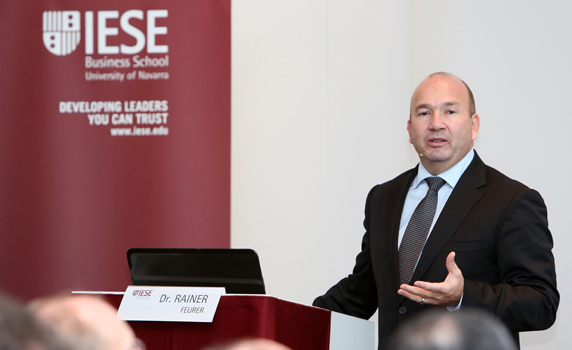
Seven years ago, BMW’s goal was to be a leading car manufacturer but now it aims to be a world leader in mobility. Strategists at BMW recognized that the changes the industry faces entail the biggest challenges of the past 100 years.
"Sustainability has become a key factor in BMWs' corporate strategy," Rainer Feurer, BMW group senior vice president sales strategy and steering, channel development, told IESE's Munich Business Summit. Prof. Marc Sachon opened meeting that was attended by 150 alumni and friends gathered at the BMW Welt facilities to hear how one of the world's leading premium car manufacturers sees its future.
Evolution and revolution
In his presentation, Feurer explained how sustainability today is fundamental to every aspect of the company's strategic planning. The carmaker researches and analyzes over 300 global trends in an attempt to understand the volatility of markets and policies, while trying to tackle the technical challenges of sustainable car production. A car manufacturer needs to think in long product life cycles. A series that hits the market in 2018, will be produced until 2025, while the cars themselves will be expected to last until 2040. "Yet, considering the rapidity of changes over the past ten years, it is extremely hard to predict what the world will look like in 2025," Feurer said.
The goal is clear, however. Through a combination of "evolution and revolution", that is, the evolution of traditional combustion engines while simultaneously working on alternative product lines such as the "i project", BMW’s goal is to produce zero emission cars. This also implies sustainable production methods. "We think carefully about what materials we use and how we recycle materials," Feurer said, claiming that a new car leaving BMW's Munich plant has produced no more than 30 grams of waste.
However, while manufacturers might seek sustainable solutions and government tries to address the issue through policy and regulations, customer choices cannot really be influenced. When it comes to buying a car, clients don't want to compromise on performance, space or functionality. "Car Manufacturers have to solve this central dilemma if they want sell their products," Feurer said, "We need to show that sustainable cars can be fun."
With its compact city car "i3", which came on to market at the end of 2013, BMW is already looking to the future. This year, it will release the "i8", a battery-driven sports car that reach speeds of 250kph. In the near future, advances in battery technology will lead to lower prices and will double or triple the car's range.
Another trend that strongly influences BMW's strategy is the change in customer's attitudes towards mobility. Preferences have shifted from car ownership, to use (through leasing), or simply access to mobility (car-sharing models such as DriveNow). As a result, BMW constantly seeks to serve the consumer's changing needs while simultaneously devising solutions to the problems of emissions and traffic density, such as its innovative IT solutions for managing parking in inner cities. "The car of the future," Feurer predicted, "will be fully connected."
BMW is aware that in its line of business the only constant is, in fact, change. However, industry experts argue that technology, not regulations, should be what drives innovation. "We cannot limit people's wish to have a better life," Feurer concluded.